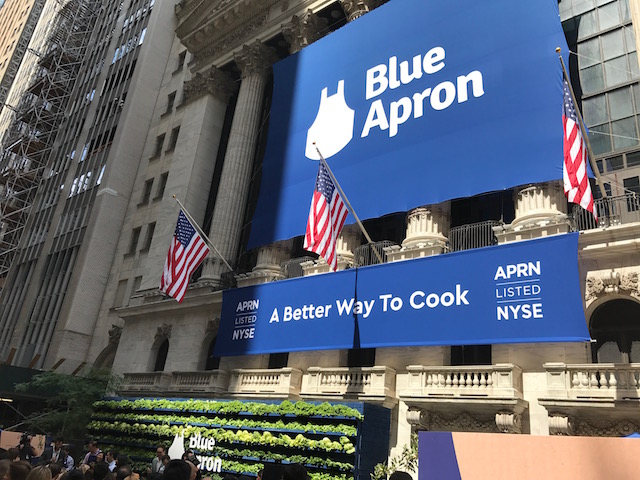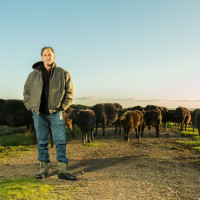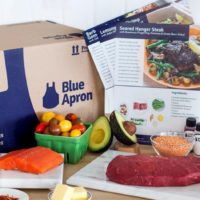
What a momentous day for the food tech community. Meal kit startup Blue Apron, which in just five years grew to $795 million in sales, launched its IPO today.
It was a lackluster debut, which has been the focus of most all media coverage, but I wouldn’t write the startup off just yet. Yes, the company raised just $300 million at a $1.9 billion valuation, one third less than it anticipated before Amazon announced it was acquiring Whole Foods. It offered 30 million common stock shares at $10 per share, which was a significant cut from the $15 to $17 it estimated just two weeks ago. Yes, shares spiked slightly in the morning to $10.46 but ended that day back at $10.00. But no one is talking about the positive impact it might have on the food system and public health.
We caught up with co-founder Matt Wadiak at the New York Stock Exchange to see what the IPO might mean for farmers and eaters, and we couldn’t be more excited by what he had to say.
“This is just the beginning for us,” Wadiak told me this morning. “It’s a great milestone. And this empowers us, as a public company, to really get in and change the food system and the way food is grown. [By] engaging more deeply with our agroecology team, with our farmers, with our cattle ranchers, with our fisheries all over the world, [we can] really bring agriculture into the mainstream focus of Americans and educate them that not all food is grown equally, that not all food is equal. We really want to advocate for regenerative agriculture, for better organic systems, and through the reduction of system inputs lower the price of sustainable agriculture and increase the availability to Americans. We think that not just good nutrition, but good food, good ingredients is a basic human right, just like clean air and fresh water.”
You read that right. Blue Apron has an agroecology team and they are committed to regenerative agriculture, which goes further than sustainable, organic agriculture by focusing on regenerating soil and ecosystems.
According to Wadiak, the IPO gives Blue Apron more leverage to promote this vision. “We raised a big round, so we’re going to continue to invest into our food system, into our supply chain, engage more deeply with farmers, and continue to invest more deeply in our internal team.”
What does it mean to invest in the supply chain? Blue Apron already provides a free soil testing service to the farmers it works with that allows them to evaluate the nutrient load in their soil. With that data, Blue Apron then makes recommendations for crop families the farmers could be growing to improve soil health and yields. For example, if a farmer grew a brassica last season, the company might recommend it grow a legume this season to fix nitrogen naturally. Blue Apron then guarantees that it will purchase the full crop production and uses it in a future recipe.
By combining this service with sensor technologies, heat units and satellites, Blue Apron is developing a “national database of farms and growing conditions, so we can predictively analyze from germination to harvest time when that food will become available at harvest and by measuring the yield output estimates we can predict that and put in our menus in an appropriate forecast, so we can plan our menus around it,” explains Wadiak.
As demand for sustainable food outpaces supply, the companies that have the best chance of winning the hearts and dollars of eaters are those that are investing in the growth of the supply chain. With the acquisition of BN Ranch and its investment in its supply chain, Blue Apron is setting itself up for success from an ingredient perspective. That being said, there are still tons of areas for concern, which we’ll dive into over the next couple of weeks.
As I wrote earlier, I wouldn’t write Blue Apron off just yet – things are just starting to get really interesting.
Check out our full interview below and share your thoughts on the Facebook Live Post.
Have questions for the Blue Apron team? Let us know!

![Blue Apron CEO on Its Business Model, Scaling Distribution & Sourcing [Video]](https://foodtechconnect.com/wp-content/uploads/2013/12/Screen-shot-2013-12-02-at-8.23.30-PM-200x200.png)



